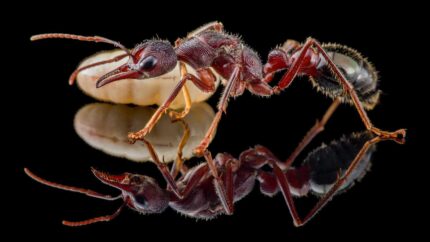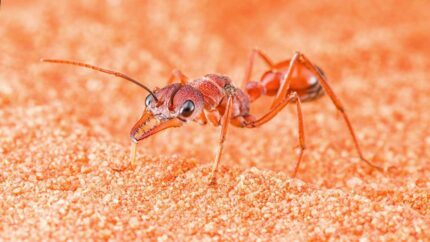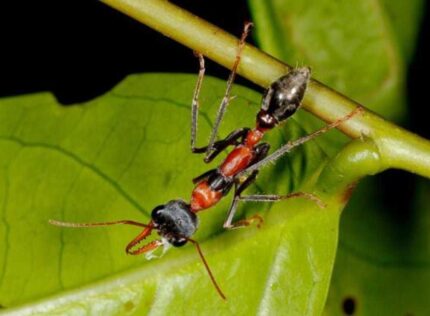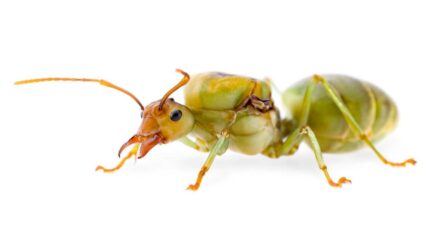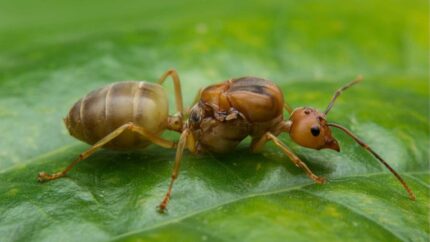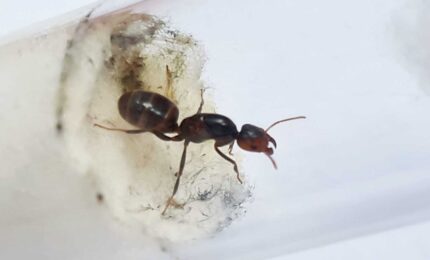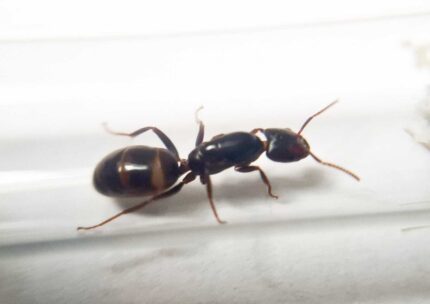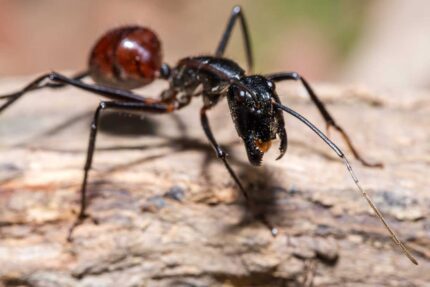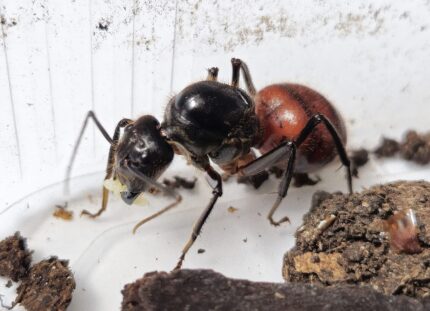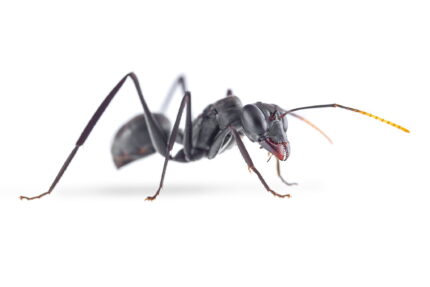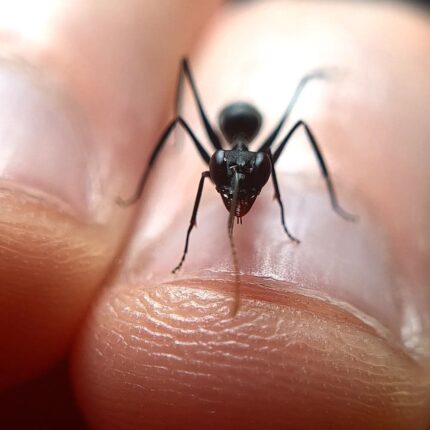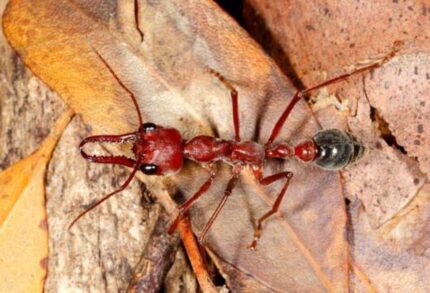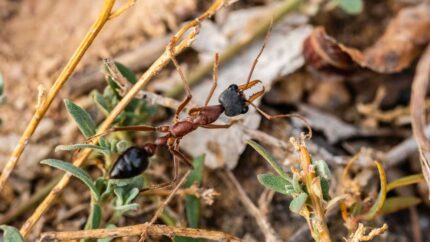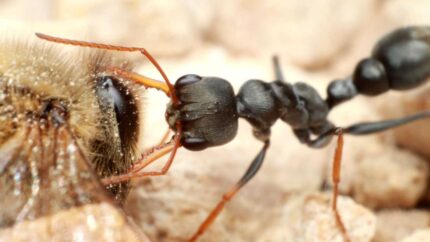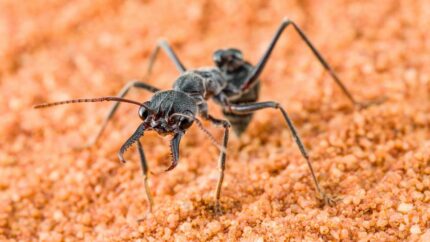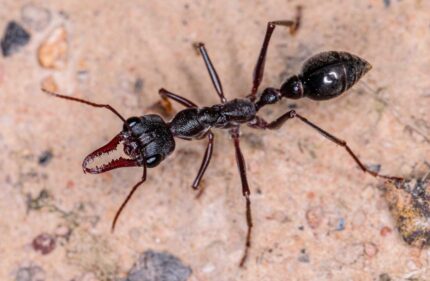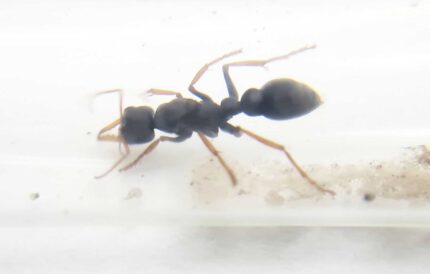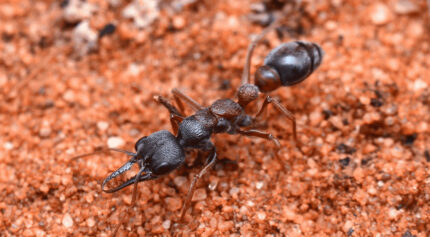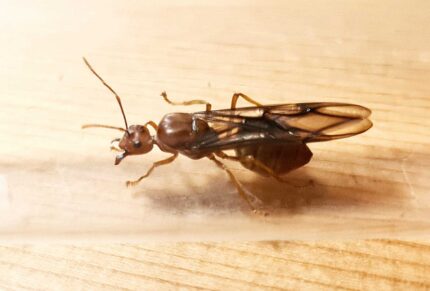Mostrando los 16 resultados
Myrmecia forficata
2359,90 zł – 3299,90 złThe Myrmecia forficata is a species of ant with a monogynous colony type and up to several hundred workers. They have a medium development rate and are characterized by their size, with queen ants measuring 23-27 mm and workers measuring 17-23 mm. They have a dark red color with a black belly and sickle-shaped jaws. They feed on food insects, fruit, and syrup, and require a humidity level of 30-50% in the arena and nest.
Myrmecia nigriscapa
2279,90 zł – 3189,90 złThe Myrmecia nigriscapa is a type of ant species that can have monogynous or occasionally polygynous colonies. The colonies can have several hundred workers and have a medium development rate. The ants range in size from 17-25 mm for workers and 23-26 mm for queens. They are dark red in color with a black belly and have strong, sickle-shaped jaws. They primarily feed on food insects like cockroaches and crickets, as well as fruit and syrup. The ideal humidity for their habitat is not specified.
Myrmecia nigrocincta
1899,90 zł – 2779,90 złThe Myrmecia nigrocincta ant is a monogynous species with colonies consisting of several hundred workers. They have a medium development rate and are categorized by their size, with queens measuring 18-22 mm and workers measuring 15-21 mm. These ants have a dark red color with a black belly and distinctive sickle-shaped jaws. Their diet consists of food insects, fruit, and syrup. They thrive in arenas with a humidity level of 30-50%.
Oecophylla smaragdina
429,90 złLooking to learn about fascinating creatures? Meet Oecophylla smaragdina, the green weaver ant. This comprehensive guide covers their colony type, size, development speed, nutrition, and more. Discover the unique characteristics and captivating behavior of this remarkable species.
Azteca delpini antillana
459,90 zł – 799,90 złAzteca forelii
499,90 zł – 829,90 złAzteca forelii is a monogynous ant species with several thousand individuals in a colony. They have a fast development speed. The queen is 13-15mm in size, while workers are 3-5mm. They are dark brown in color. Their diet consists of food insects, syrup, fruits, vegetables, jelly, and cooked chic.
Dinomyrmex gigas
2599,90 zł – 5690,90 złDinomyrmex gigas is a monogynous ant species with colonies of up to 2000 workers. They have slow development speed. The queen measures 29-36 mm, workers are 18-24 mm, and majors are 23-28 mm. They are black with a red-orange flake coloration. Their diet includes food insects, syrup, fruit, vegetables, jelly, and cooked chicken.
Gigantiops destructor
1799,90 złGigantiops destructor is a monogynous ant species with a colony size of up to 300 workers. They have a medium development rate and the queen measures 13-15mm while the workers measure 10-15mm. They are black in color and their nutrition consists of food insects, syrup, and sweet fruit. They thrive in humid environments, with an arena humidity of 70-80% and nests at 70-90%.
Myrmecia brevinoda
2599,90 zł – 3399,90 złMyrmecia brevinoda is a species of ant that can form colonies with one or more queens and can have up to several hundred workers. They have a medium development rate and grow to be 24-30 mm for queens and 17-26 mm for workers. They are dark red in color with a black belly and have powerful jaws. They feed on food insects, fruits, and syrup. The required humidity for this species is not specified.
Myrmecia nigriceps
1989,90 złMyrmecia nigriceps is a monogynous ant species with colony sizes of up to several hundred workers. They have a medium development rate and the queen measures 19-23 mm in size while the workers measure 16-21 mm. They have a black head and back with an orange body. Their diet includes food insects, fruit, and syrup. They prefer an arena humidity of 30-50% and a nest humidity of 50-70%.
Myrmecia pilosula
2289,90 złMyrmecia pilosula is a ant species that has a monogyny colony type and can have several hundred workers. The ants are dark red in color with a black belly and sickle-shaped jaws. They feed on food insects, fruit, and syrup, and require a humidity level of 30-50%. Development rate is medium.
Myrmecia pyriformis
2259,90 złThe Myrmecia pyriformis ant species is monogynous and can have a colony size of several hundred workers. They have a medium development rate and the queen is around 23-26 mm in size, while workers are around 14-23 mm. They have a brown-black color and their nutrition includes food insects, fruit, and syrup. They require humidity levels of 30-50% in the arena and 50-70% in the nest.
Myrmecia similllina
2189,90 złMyrmecia similllina is a species of ant that can have both monogynous and polygynous colonies. The colony size can reach several hundred workers. They have a medium development rate. The queen measures 20-24mm in size, while the workers measure 16-22mm. They have a dark red color with a black belly and strong, sickle-shaped jaws. They consume food insects like cockroaches and crickets, as well as fruit and syrup. The ideal humidity level for this species is unknown.
Myrmecia tarsata
2137,90 złMyrmecia tarsata is a black ant species with a monogynous colony type. The colony can have several hundred workers and has a medium development rate. The queen is 17-20mm in size while the workers are 15-18mm. They feed on food insects, fruit, and syrup. The ants require humidity levels of 30-50% in the arena and 50-70% in the nest.
Myrmecia varians
2059,90 złMyrmecia varians is a monogynous ant species with a colony size of up to 1000 workers. The ants have a medium development rate and the queen measures 17-19 mm while the workers measure 14-17 mm. They are black and dark brown in color and feed on food insects, syrup, and fruits. They require a humidity level of 50-70% in their arena and 60-80% in their nest.
Oecophylla longinoda
469,90 złOecophylla longinoda is a polygyne ant species with colony sizes ranging from 100,000 to 500,000 workers. They have a very fast development speed. The queen ants are 12-16 mm in size while the workers are 4-9 mm. They have a yellowish brown to brown color with a strong chest. Their nutrition includes insect food, syrup, fruits, vegetables, jelly, and cooked chicken.


